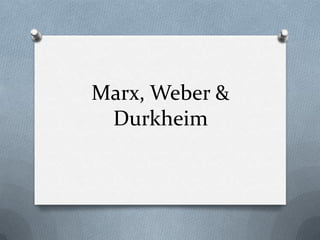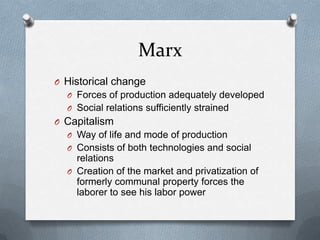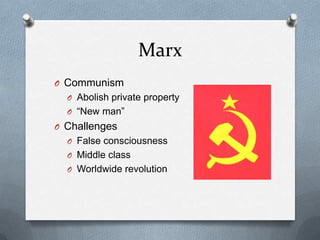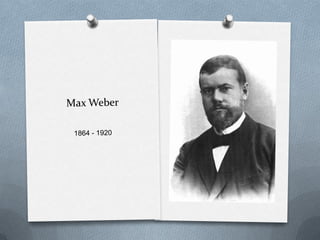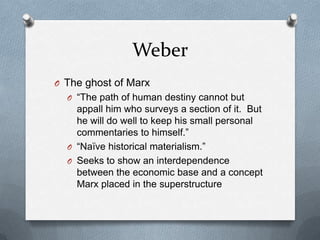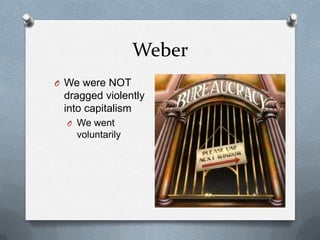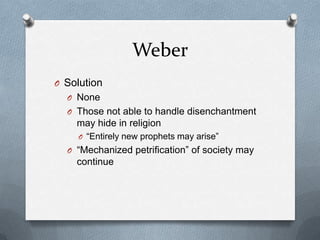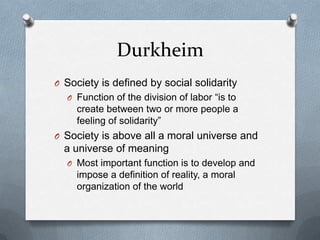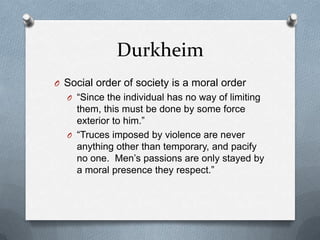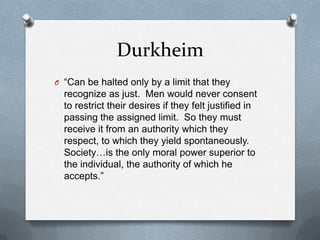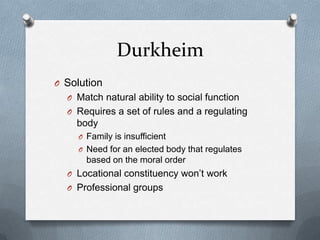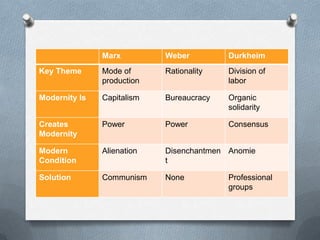Marx Weber Durkheim
- 1. Marx, Weber & Durkheim
- 2. Karl Marx1818 - 1883
- 3. MarxHistorical materialismMaterial conditions push history“The history of all hitherto existing society is the history of class struggles”From earth to heavenBoth a general theory of history and a methodologyTotalizing theory
- 4. MarxBase-superstructure modelSociety is defined by its productive forces and the social relations contained in the production of its material life
- 6. MarxOnly through historical materialism and the base-superstructure model is empirical observation possibleIdeas of the ruling class“The ideas of the ruling class are in every epoch the ruling ideas.”
- 7. MarxHistorical changeForces of production adequately developedSocial relations sufficiently strainedCapitalismWay of life and mode of productionConsists of both technologies and social relationsCreation of the market and privatization of formerly communal property forces the laborer to see his labor power
- 8. MarxUse valueActual attributes of the objectExchange valueDetermined by supply and demandThe only thing all commodities have in common“The product of labor is labor which has been embodied in an object and turned into a physical thing; this product is an objectification of labor.”
- 9. MarxWhere does profit come from?Exploitation of the laborer“The worker becomes poorer the more wealth he produces and the more his production increases in power and extent. The worker becomes an even cheaper commodity the more goods he creates. The devaluation of the human world increases in direct relation with the increase in value of the world of things.”
- 10. MarxConsequences of capitalismShows us what we can doGives birth to the proletariat“Society as a whole is more and more splitting up into two great hostile camps, into two great classes directly facing each other: Bourgeoisie and Proletariat”
- 11. MarxModernity and the Bourgeoisie“The bourgeoisie cannot exist without constantly revolutionizing the instruments of production, and thereby the relations of production, and with them the whole relations of society.”
- 12. Marx“All fixed, fast-frozen relations, with their train of ancient and venerable prejudices and opinions, are swept away, all new-formed ones become antiquated before they can ossify. All that is solid melts into air, all that is holy profaned, and man is at last compelled to face with sober senses, his real conditions of life, and his relations with his kind.”
- 13. MarxAlienationProcess of labor“Work is external to the worker…it is not a part of his nature…consequently, he does not fulfill himself in his work but denies himself, has a feeling of misery rather than well-being, does not develop freely his mental and physical energies but is physically exhausted and mentally debased.”“He becomes an appendage of the machine, and it is only the most simple, most monotonous and most easily acquired knack that is required of him.”
- 14. MarxAlienationProduct of labor“The object produced by labor, its product, now stands opposed to it as an alien being, as a power independent of the producer.”
- 15. MarxAlienationFellow workers“The essential condition for the existence, and for the sway of the bourgeois class, is the formation and augmentation of capital; the condition for capital is wage-labor. Wage-labor rests exclusively on competition between the laborers.”
- 16. MarxAlienationSpecies being“The worker puts his life into the object, and his life then belongs no longer to himself but to the object.”“It makes species-life into a means of individual life.”
- 17. Marx“His work is not voluntary but imposed, forced labor. It is not the satisfaction of a need, but only a means for satisfying other needs. Its alien character is clearly shown by the fact that as soon as there is no physical or other compulsion it is avoided like the plague.”
- 18. MarxTime for a change…Class consciousnessPauperization of the proletariatFace to face with our material conditions“What the bourgeoisie therefore produces, above all, are its own grave-diggers. Its fall and the victory of the proletariat are equally inevitable.”
- 19. MarxCommunismAbolish private property“New man”ChallengesFalse consciousnessMiddle classWorldwide revolution
- 20. Max Weber1864 - 1920
- 21. WeberUnderstanding historical relationship between systems of ideas and collective action“Elective affinity” between ideas, interests and ways of life“The influence of certain religious ideas on the development of an economic spirit.”
- 22. WeberThe ghost of Marx“The path of human destiny cannot but appall him who surveys a section of it. But he will do well to keep his small personal commentaries to himself.”“Naïve historical materialism.”Seeks to show an interdependence between the economic base and a concept Marx placed in the superstructure
- 23. Weber
- 24. WeberCapitalismA symptom of the increasing rationalization of the worldApplication of reason to economic behaviorBureaucratic organization of laborModern society is bureaucracy
- 25. WeberBureaucracyIncreasing efficiency by eliminating idiosyncrasiesSeparate of personal and publicThe Files“Seeks to operate without regard for persons”
- 26. WeberWe were NOT dragged violently into capitalismWe went voluntarily
- 27. WeberProtestant ReformationMartin LutherThe Calling – the work a person does is determined by GodImbues worldly activity with religious significanceCalvinPredestination – salvation is predetermined by God
- 28. WeberMonitoring one’s state of graceSuccess in business“Works are not the cause, but only the means of knowing one’s state of grace, and even in this only when they are performed solely for the glory of God.”Willingly work more than we had toReinvest rather than indulge
- 29. Weber“Christian asceticism…had, on the whole, left the naturally spontaneous character of daily life in the world untouched. Now it stroke into the market-place of life, slammed the door of the monastery behind it, and undertook to penetrate just that daily routine of life with its methodicalness.”
- 30. WeberDisenchantment“Elimination of magic from the world”“There are no mysterious incalculable forces that come into play, but rather that one can, in principle, master all things by calculation. This means that the world is disenchanted.”
- 31. WeberBureaucracy “should only lie on the shoulders of the ‘saint like a light cloak, which can be thrown aside at any moment’”Iron cage from which the spirit escapes
- 32. WeberCapitalism is mechanicalNo long need the religious root“Today the spirit of religious-asceticism – whether finally, who knows? – has escaped from the cage. But victorious capitalism, since it rests on mechanical foundations, needs its support no longer.”The individual has no choice but to participate“The Puritan wanted to work in a calling; we are forced to do so.”Protestant ethic becomes the secular work ethic
- 33. WeberSolutionNoneThose not able to handle disenchantment may hide in religion“Entirely new prophets may arise”“Mechanized petrification” of society may continue
- 34. Émile Durkheim1858 - 1917
- 35. DurkheimFunctionalism“If it is as it is at any given moment, it is because the conditions in which men are living at that time do not permit it to be otherwise.”Natural selection
- 36. DurkheimIndividuals are a product of societySocial permeates and shapes individual consciousnessSociety is the source of human capabilitiesConstraints imposed are limiting and enablingSociety is a reality sui generisThe whole is greater than the sum of its parts
- 37. DurkheimSociety is defined by social solidarityFunction of the division of labor “is to create between two or more people a feeling of solidarity”Society is above all a moral universe and a universe of meaningMost important function is to develop and impose a definition of reality, a moral organization of the world
- 38. DurkheimCollective conscience“The totality of beliefs and sentiments common to the average members of a society forms a determinate system with a life of its own. It can be termed the collective or common consciousness.”Gives individuals a sense of dealing with a solid and meaningful realityPurpose of society “is to eliminate or at least to moderate warfare among men, by subjecting the physical law of the strongest to a higher law”
- 39. Durkheim“It is not human nature which can assign the variable limits necessary to our needs. They are thus unlimited so far as they depend on the individual alone. Irrespective of any external regulatory force, our capacity for feeling is in itself an insatiable and bottomless abyss. But if nothing external can restrain this capacity, it can only be a source of torment to itself. Unlimited desires are insatiable by definition…Inextinguishable thirst in constantly renewed torture.”
- 40. DurkheimSocial order of society is a moral order“Since the individual has no way of limiting them, this must be done by some force exterior to him.”“Truces imposed by violence are never anything other than temporary, and pacify no one. Men’s passions are only stayed by a moral presence they respect.”
- 41. Durkheim“Can be halted only by a limit that they recognize as just. Men would never consent to restrict their desires if they felt justified in passing the assigned limit. So they must receive it from an authority which they respect, to which they yield spontaneously. Society…is the only moral power superior to the individual, the authority of which he accepts.”
- 42. DurkheimMechanical SolidarityOrganic SolidarityPrimitive societyBased on resemblanceMinimal division of labor based on sex and ageLittle interdependence between social unitsModern societyProtect by dividingBased on division of laborInterdependence between social unitsConsensus
- 43. DurkheimDevianceMechanical solidarityRepressive, punitive law needed to heal the wound made by the deviant in the collective conscienceOrganic solidarityRestitutive law needed to reintegrate the deviant into society
- 44. DurkheimShift was so quick that equilibrium between natural ability and social function was not reached
- 45. DurkheimAnomieForced division of laborPeople feel without directionRepeating “the same movements with monotonous regularity, but without having any interest or understanding of them.”“No more than a lifeless cog, which an external force sets in motion and impels always in the same direction and in the same fashion.”
- 46. DurkheimAnomie“The division of labor does not produce these consequences through some imperative of its own nature, but only in exceptional and abnormal circumstances.”System is dysfunctional where some people have power to cause a mismatch of natural ability and social function
- 47. DurkheimSolutionMatch natural ability to social functionRequires a set of rules and a regulating bodyFamily is insufficientNeed for an elected body that regulates based on the moral orderLocational constituency won’t workProfessional groups
